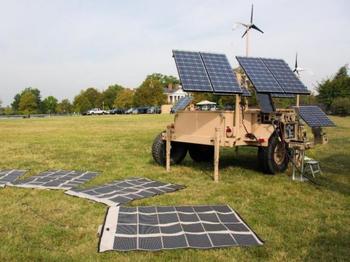Sponsor a Senior Design Project
Your organization can engage with Mason students with creative collaboration on a Systems Engineering Senior Design Project.
Learn More
Center for Air Transportation Systems

The Center for Air Transportation Systems Research at George Mason University encourages excellence in education and research in air transportation systems engineering. This research center analyzes, optimizes, builds, and tests new and existing air transportation methods; making them safer, more efficient, and cost-effective. Its work includes transportation network-of-networks simulation, optimization, and analysis; complex adaptive systems simulation and analysis; airport and airspace simulation and performance analysis; and rare-event safety analysis for systems and devices.
Center of Excellence in Command, Control, Communications, Computing, Intelligence, and Cyber

In the face of modern threats, the "tip of the spear" is forged with a click of a mouse. Mason is the first and only civilian university-based Center of Excellence in C4i and Cyber. The comprehensive academic and research program examines sensing and fusion, C3 architectures, communications and signal processing, command support and intelligent systems, modeling and simulation, and distributed education and training. The center provides a bridge between the College of Engineering and Computing faculty expertise and the needs of government/defense/intelligence information technology users. The C4i and Cyber Center is actively engaged with the Department of Defense and related critical functions.
Center for Secure Information Systems

The Center for Secure Information Systems provides a dedicated environment for developing expertise in both the theoretical and applied aspects of information systems security. Its scope encompasses information secrecy, integrity, and availability problems in military, civil, and commercial sectors.

C-RASC
The Center for Resilient and Sustainable Communities (C-RASC) is a transdisciplinary research center that addresses critical real-world problems through integrated approaches that build resilience. C-RASC’s vision is to support communities worldwide to create life-changing social and economic opportunities through locally led, bottom-up resilience and sustainability initiatives supported by effective, replicable models. Distinguishing features of C-RASC include: concentrating on bottom-up, community-led approaches; addressing resilience in comprehensive and measurable ways; integrating the impacts and policy implications of converging, accelerating technological changes; and including practitioners with field experience. C-RASC also provides training opportunities for students, researchers, and practitioners, and oversees the global STAR-TIDES knowledge-sharing network.
